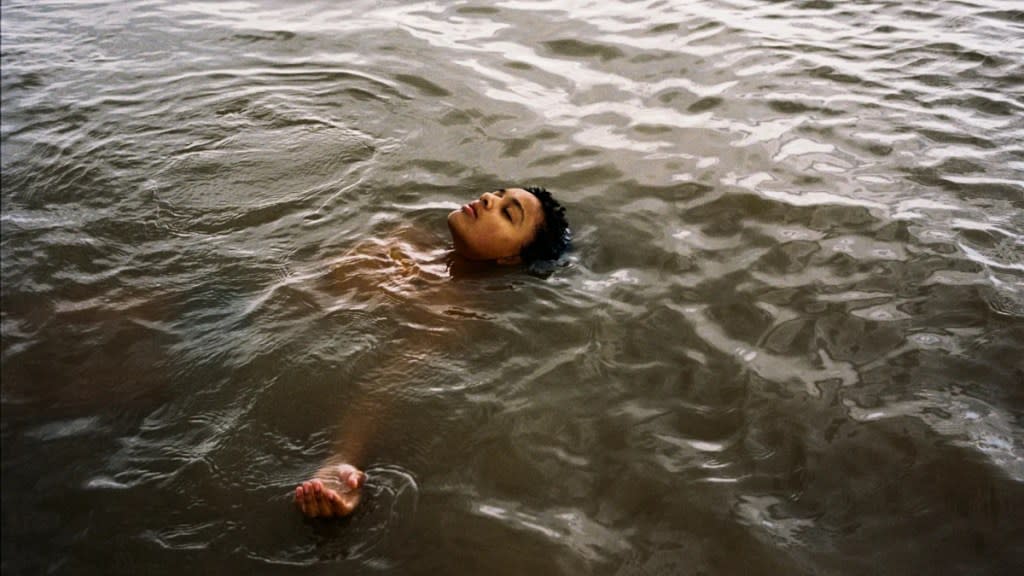‘Bird’ Review: Andrea Arnold’s Arresting, Surreal Drama Soars

- Oops!Something went wrong.Please try again later.
- Oops!Something went wrong.Please try again later.
In “Bird,” the excellent new drama from writer-director Andrea Arnold, we are dropped into the life of 12-year-old Bailey in one of the few times where she seems truly free. Played by Nykiya Adams in an astounding feature debut, she is sharing a peaceful moment with a bird when nobody else is around. While a smile gently sneaks onto her face, it disappears just as quickly when the moment of quiet reverie is interrupted by the troubles that define her life. Bailey will spend the remainder of the film trying to find this peace amidst everyday turmoil, forming a bond with a stranger who floats through her community in North Kent looking to reconnect with their past.
Known only as Bird and played by the always fantastic Franz Rogowski of the recent “Passages,” he soon opens up a new world for her. What the film finds in Bailey’s journey is messy, melancholic, and, following one quite significant leap by Arnold, tied to something closer to magical realism. This may throw some of those expecting it to remain grounded, but that only makes the moment it takes flight all the more arresting. It’s a big swing, but a worthwhile one.
Premiering Thursday afternoon in competition at the 2024 Cannes Film Festival, it’s the type of film that will initially be familiar to those who’ve seen much of Arnold’s past work. However, it plays best as a fitting companion piece of sorts to her most recent narrative feature “American Honey,” which won the 2016 Jury Prize and was her first film set outside the United Kingdom. “Bird” brings her back home, but it also sees her taking things in a rather bold new direction. What ensures this works is that the characters and their interactions are all beautifully realized.
When we first begin to see what it is that Bailey is dealing with, it’s in interactions with her father. This is because Bug, played by Barry Keoghan of “Saltburn,” feels like he is still only a kid himself. Ill-equipped to be raising Bailey as well as her brother Hunter (Jason Buda), that doesn’t stop him from constantly demanding things from them. The most recent is to be involved in his new marriage. There is an absurdity in his insecurity over this, but it also masks his more potentially abusive nature that rears its ugly head when he doesn’t get his way. His overall presence keeps everything tense.
Thus, when Bailey first encounters Bird, we see how he is everything that her father isn’t. He is someone that listens to her and takes her seriously. While their initial meeting is strange, the gentleness with which he moves through the world exists in stark contrast to the pain everywhere else. Not only is Rogowski precisely attuned to what is needed to capture this, but he is able to delicately embody the somberness that exists right alongside it. Little mannerisms and details of how he changes throughout the film establish how he is carrying much with him. Though he doesn’t usually vocalize it, his performance keeps the pain forever present. His character may occasionally fade into the background, but it is his poetic sense of poise that sticks with you even when he isn’t there. It is in his piercing stare that we see a lost soul trying to find home.
Even more critically, Adams is similarly doing exactly what is needed for the entire film to work. Above all else, she is the standout discovery of the festival thus far. The way she takes us through pain, anger, fear, and, eventually, joy is where the film soars to its highest point. Never once does she overplay any scene as every move is more refreshingly subtle and honest. The world Bailey is facing is tumultuous and Adams is transcendent in navigating this. Every change of expression or rebellious retort carries with it a whole range of feelings that cement “Bird” as a compelling and compassionate character study as much as it is a profile of a time and place.
Just as Bailey takes videos to process and make sense of the world, projecting them on her wall so she can experience them by herself again, Arnold finds plenty of striking imagery of her own. In particular, the recurring moments where we see Rogowski standing alone on a tall building provide unexpected poignancy. There is magic to these images. Just as we look up with Bailey at the figure looming over everything, there is also one spectacular scene where we look at the world below from this same vantage point. While everything looks quite small from up that high, the point is that it is these tiny elements that define life itself. In Arnold’s eyes, there is a beauty to all of this just as there is a brutality that can break through when we least expect it to.
We see just enough of what is happening to be confronted with the more audacious magical flourish just as she shifts the perspective back to Bailey to cut back through her own memories. It’s at this moment that the film fully spreads its wings. You’ll either be on board or you won’t. What is inescapable is just how great Adams is through all of that. She holds what could be an unwieldy finale together. Even when it launches up into the skies, her feet remain on the ground.
The post ‘Bird’ Review: Andrea Arnold’s Arresting, Surreal Drama Soars appeared first on TheWrap.

